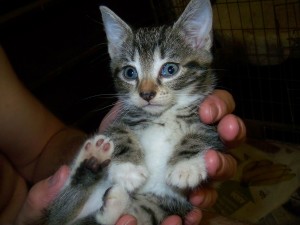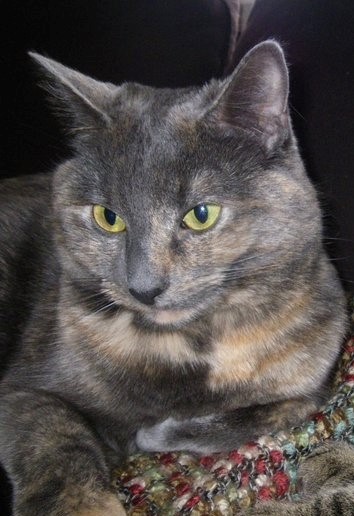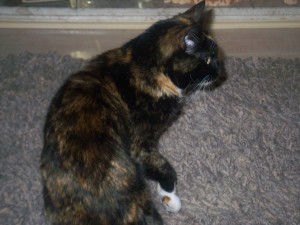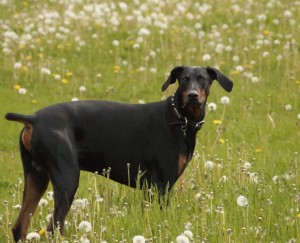 Stan, a six year old Doberman, visited us in January of 2015 with a cough that he had had for a few weeks. He was very well in himself but the cough was persistent. Stan had a heart murmur but there were no signs his heart was failing and we wondered whether he had an infection. He had some antibiotics and improved a little but the cough never really went away.
Stan, a six year old Doberman, visited us in January of 2015 with a cough that he had had for a few weeks. He was very well in himself but the cough was persistent. Stan had a heart murmur but there were no signs his heart was failing and we wondered whether he had an infection. He had some antibiotics and improved a little but the cough never really went away.
After trying antibiotics for a while we elected to investigate Stan’s heart disease a little more as it had always been in our mind that it could be the root of the problem. Although the antibiotics had improved things, the cough had not fully resolved and his breathing rate had started to increase. A heart murmur indicates that something is not working properly in the heart – it may be a problem with the valves or the chambers of the heart. Dobermans tend to suffer from a particular type of heart disease known as dilated cardiomyopathy (DCM). This means the heart chambers get very large, the heart muscle gets thin and the heart does not beat as effectively. This can lead to arrhythmias (abnormal heart rhythms) which can be life-threatening if not managed well.
There are a number of parameters we check on a clinical examination that can tell us whether or not we think a heart murmur is starting to cause clinical problems. Heart rate and breathing rate both go up if the heart is starting to struggle, pulses can become weaker – and at times do not coincide with the heartbeat which they normally should do and more effort is seen with breathing. Stan hadn’t shown these signs, despite the cough (which can be another indication) but after a while his breathing rate crept up and he was putting more effort into each breath.
We ultrasound scanned Stan’s heart (known as an echocardiogram) and this showed a heart with large dilated chambers making us very suspicious of DCM. We were keen to get Stan scanned by a cardiac specialist to get a more definitive diagnosis and prognosis and whilst we were waiting for the visiting specialist to come we started Stan on some medications to try and help him. When the heart is not working properly we see a build-up of fluid in the chest (and sometimes in the abdomen) which is the reason breathing rate and effort increase. We started on a diuretic to try and shift the fluid and also onto another medication which helped the heart pump and be more productive at getting the blood around the body.
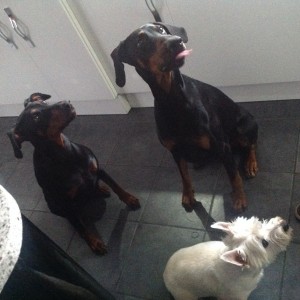 Stan responded well to those medications. The cardiologist scanned Stan’s heart and confirmed DCM. An additional medication was added and Stan had to wear a Holter monitor for 24 hours. This monitors Stan’s heart rhythm over that time and will pick uo any abnormal rhythms. Thankfully none were found at this time but overall the prognosis was not very good for Stan. Many dogs onloy survive a few weeks from diagnosis of DCM and some can die suddenly so we knew that we may not have Stan for much longer.
Stan responded well to those medications. The cardiologist scanned Stan’s heart and confirmed DCM. An additional medication was added and Stan had to wear a Holter monitor for 24 hours. This monitors Stan’s heart rhythm over that time and will pick uo any abnormal rhythms. Thankfully none were found at this time but overall the prognosis was not very good for Stan. Many dogs onloy survive a few weeks from diagnosis of DCM and some can die suddenly so we knew that we may not have Stan for much longer.
Over the coming weeks Stan did really well. He had the occasional dip and we had to increase the dose of his medications but he was bright and lively with normal breathing and heart rates. His owner measured his breathing rate at home by counting how many times he took a breath (in and out is one breath) in fifteen seconds and multiplying it by four. This is a simple but very effective way of picking up an early deterioration.
We couldn’t believe how well Stan was doing as first weeks passed and then months. He loved life and food and didn’t seem to realise anything was wrong with him at all! Stan had another scan with the cardiologist at the end of July. This showed that sadly Stan’s heart really wasn’t working very well at all and whilst Stan in himself seemed well, we were nearing the end of what we were able to do. Some additional medication was added in and Stan continued to be monitored. With more medication we had to monitor Stan’s kidney function to ensure we weren’t causing them to fail, but generally Stan responded well.
Stan continued to be brilliant well into October, but finally the day that we had all been dreading came. Stan started to get fluid building up in his abdomen and his breathing effort increased. His owners knew that there was nothing more we could do – Stan was at the very top dose of all the medications we could give him.
We put Stan to sleep in a lovely spot with his Mum holding him. He lived for eight months to the day from his diagnosis. Those were really happy months. He surpassed all our expectations and we are so glad he didn’t bother reading the textbooks! Stan was a true gentleman of a dog, dignified and loving to the end.
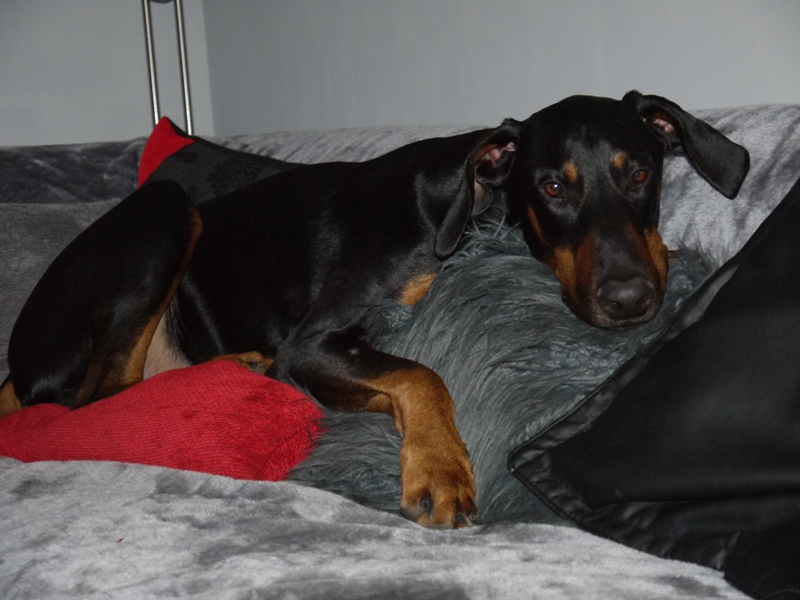
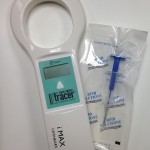 As of the 6th April 2016 it will be a legal requirement to microchip your dog. Permanent identification of dogs in the UK will have many benefits. A microchip will help reunite lost dogs with their owners and will act to encourage responsible dog ownership. The introduction of this law is also aimed to help tackle puppy farming and help report hereditary health problems
As of the 6th April 2016 it will be a legal requirement to microchip your dog. Permanent identification of dogs in the UK will have many benefits. A microchip will help reunite lost dogs with their owners and will act to encourage responsible dog ownership. The introduction of this law is also aimed to help tackle puppy farming and help report hereditary health problems
